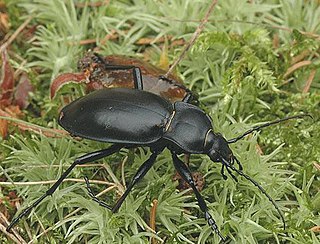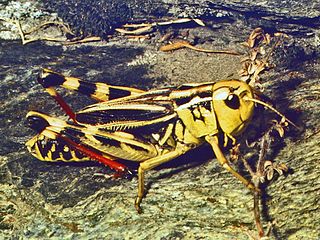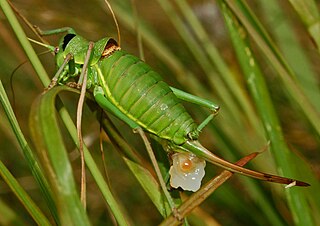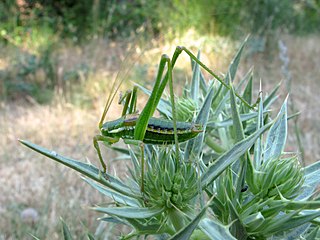
The grasshopper subfamily Acridinae, sometimes called silent slant-faced grasshoppers, belong of the large family Acrididae in the Orthoptera: Caelifera.

Tulip snail or tulip shell is the common name for eight species of large, predatory, subtropical and tropical sea snails from the Western Atlantic. These species are in the genus Fasciolaria. They are marine gastropod mollusks in the family Fasciolariidae, the spindle shells, tulip shells and their allies.

Xenophora, commonly called carrier shells, is a genus of medium-sized to large sea snails, marine gastropod mollusks in the family Xenophoridae, the carrier snails or carrier shells. The genus Xenophora is the type genus of the family Xenophoridae.

Carabus is a genus of beetles in family Carabidae. The genus is highly diverse with 94 subgenera, 959 species and 2300 subspecies, thus is the largest genus in the subfamily Carabinae. The vast majority are native to the Palearctic, but 16 Nearctic species are also known. Carabus spp. are 12–50 mm (0.47–1.97 in) long, and most species are wingless and often very colourful. These are nocturnal, predatory beetles that feed on snails, earthworms, and caterpillars. Most Carabus species were thought to have inhabited the Eurasian forest, but the species' low dispersal abilities altered the distribution of lineages within the genus.

Cymindis is a genus of ground beetle native to the Palearctic, the Near East, and North Africa. It contains the following species:

Arcyptera is a genus of grasshoppers belonging to the family Acrididae subfamily Gomphocerinae. These grasshoppers are present in mainland Europe, and in the eastern Palearctic realm through to northeastern Asia.

The Bradyporinae are a subfamily in the family Tettigoniidae, based on the type genus Bradyporus. First described as a family, "Bradyporidae", the first use as Bradyporinae was by Brunner von Wattenwyl in 1878.

Antaxius is a genus of bush crickets in the tribe Platycleidini found in Europe.

Pamphagidae is a family of grasshoppers belonging to the superfamily Acridoidea. The species in this family can be found in Africa, Europe and Asia.

Bradyporus is a genus of bush crickets, found in south-eastern Europe and western and central Asia. It is the type genus of the subfamily Bradyporinae and tribe Bradyporini.

Dociostaurus is a genus of grasshoppers in the family Acrididae, subfamily Gomphocerinae and typical of the tribe Dociostaurini. Species are found in Africa, southern Europe and Asia, and includes the economically important Moroccan locust.

Odontura is a genus of bush crickets in the subfamily Phaneropterinae and typical of the tribe Odonturini. Species can be found in Africa and Europe.

Pamphaginae is a subfamily of grasshoppers in the family Pamphagidae, with species found in Africa, Europe and Asia.

Heteracris is a genus of short-horned grasshoppers in the family Acrididae. There are more than 60 described species in Heteracris, found in Africa, southern Europe, and manland Asia through to India.

Ramburiella hispanica is a species of slant-faced grasshopper in the family Acrididae. It is found in southern Europe and northern Africa.

Stauroderus is a genus of slant-faced grasshoppers in the family Acrididae. There are three described species in Stauroderus, found in the Palearctic realm.

Hetrodes is a genus of South African Orthopterans, typical of the subfamily Hetrodinae, erected by Fischer von Waldheim in 1833. It is a monotypic genus and currently the sole representative of the tribe HetrodiniBrunner von Wattenwyl, 1878.
Sciobia is a genus of crickets in the family Gryllidae and monotypic tribe Sciobiini; it was erected by Hermann Burmeister in 1838. Species can be found in NW Africa and the Iberian peninsula.

Phyllodromica is a genus of mostly Palaearctic cockroaches in the subfamily Ectobiinae, erected by Franz Xaver Fieber in 1853. The recorded distribution for species includes: mainland Europe, North Africa, the Middle East through to central Asia.


















